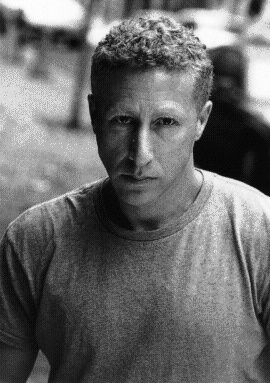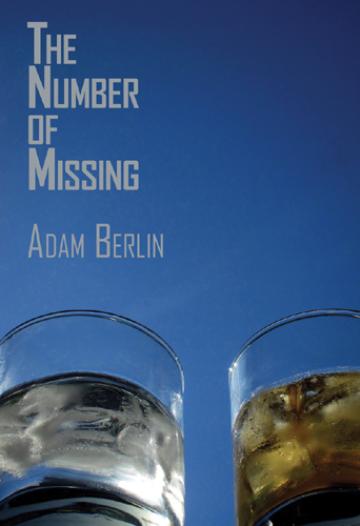The Number of Missing: Adam Berlin Interview
Adam Berlin is the literary equivalent of the boxer who relishes the craft, the pugilist who respects the “sweet science” to such a degree that he willingly pays his dues, is patient to wait his turn and hone his skills, until the moment comes when a championship bout is offered, and with it the opportunity to step into the ring and show the world what he is made of, and why it pays to be diligent, dedicated and determined. I use boxing as an analogy because Berlin has written well and often about a sport that has captured the imagination of many famous writers.
But despite his talent in depicting the ring on the page, it is Berlin's upcoming novel, The Number of Missing (Spuyten Duyvil), which is answering the bell to enthusiastic reviews. Thoughtful, empathic, and full of soul, The Number of Missing is set in New York City after the 9/11 attacks, the story anchored around two characters who are dealing with a common grief stemming from the tragedy. Berlin taps into his own pain in the book (it is dedicated to a policeman friend who perished when the Twin Towers fell), but he is careful to weave this sadness into a riveting narrative that draws readers deep into the complexity of relationships, no matter if the people involved are alive or dead. In this regard it resurrects themes from popular novels that rose from the ashes of World War I, where writers like Ford Maddox Ford and F. Scott Fitzgerald gave the reading world damaged characters that go on with the business of living, but not really. It is this "not really" that Berlin explores masterfully in his novel. Here's more from this rising writer.
Q: Tell us about the idea behind The Number of Missing and the challenges you faced writing about such a difficult tragedy. What do you think our society has learned and still needs to learn about 9/11?
I was living downtown when 9/11 happened, on the corner of Bedford and Barrow Streets. I used to run to the World Trade Center and back to my apartment most mornings. As with all New Yorkers, the day stuck with me for a long time. For months after, I'd walk out of the subway and see the towers that weren't there. The city seemed dead or at least not real, as if everything had slowed or stopped, and I remember feeling that I'd wake up, that all of us would wake up, and realize the day had never happened. But it had. In a selfish way, the day gave me a subject, a giant subject. I had always loved post-war novels—The Sun Also Rises, The Great Gatsby, The Good Soldier—because they contained so much brutal subtext that the action on the surface was always charged even when nothing much was happening. That was the kind of novel I'd always wanted to write, but my history didn't include a war or the equivalent of war.
When 9/11 happened, my history, our history, changed, and I had the framework for a post-war book. In my novel not much happens; it's about a man named David who loses his best friend Paul in the attack. David befriends Paul's new wife Mel, now a young widow, and together they drink and talk and walk the city and remember Paul. But underneath this relatively flat plot line is this momentous subtext. The hardest part about writing The Number of Missing was to keep out even the slightest hint of sentimentality. I wanted the grief to be pure, never Hallmark grief. I did more revisions on this novel, many more revisions, than any novel I'd written before because I had to keep paring it down, removing all excesses so the real emotions of anger and grief were raw and exposed. As for what we learned from this event, I don't think much. And that's part of the sadness too.
Life goes on. Twelve years have passed and unless you were scarred badly, directly, 9/11 is starting to feel like a memory with blurred edges. Soon the Freedom Tower in NYC will become an accepted part of Manhattan's landscape, which will blur the memory of 9/11 even more.
Q: You also have a novel coming out at the end of the year, Both Members of the Club, which probes a great deal into the sport of boxing. Why do you think boxers have been used so effectively as characters in fiction, thinking of two famous short stories - Hemingway's Fifty Grand and Jack London's A Piece of Steak?
Of all sports, boxing provides the best foundation for a novel or a story. Boxing is about man vs. man on the purest level—aside from gloves that protect a fighter's hands, boxing has no equipment, so it's all about physical and mental strength, one man testing himself against another. In a classic sense that's what a story usually does. It pits man against man. A character has an obstacle and has to get through that obstacle. A fighter steps into the ring and across from him is another fighter, a human obstacle. How he gets through that obstacle defines the fighter and defines the fight. Many writers feel a deep connection to boxing because they see parallels between the acts of writing and boxing.
Much of a boxer's training, which is where the real work happens, is done in solitude. There's a great quote from Muhammad Ali, which goes, “The fight is won or lost far away from witnesses—behind the lines, in the gym, and out there on the road, long before I dance under those lights.” That's what writers do. Before a book comes out, before it's under the lights—out in public, ready to be read—the writer is working behind the lines on his or her own. So there's a kinship of loneliness between writers and fighters.
As for why boxers make great characters, I think it's because fighters have to visit uncomfortable places. The great fighters adapt. The less than great ones don't—they can't get through the hard parts of a fight just as some writers can't get through the hard parts of the story as Hemingway would call them. But just stepping through the ropes is an act of putting yourself in an uncomfortable place and that's the place where good fiction resides. So if they're not depicted as stereotypical thugs, boxers can make for complex, layered characters. Their presence in a story always has a hint of something violent or explosive.
That subtext, that lurking power, can make for dramatic scenes. And of course, boxers make good characters because many of them represent the human condition. They rise quickly and they usually fall quickly. They've had their glory, some of them have been kings in the ring, champions, but with time they're not what they were. I think fighters recognize their mortality more than other athletes. Boxers are damaged—from the scars you see to the more dangerous ones you don't. Damage is a great trait for a character.
Q: You also teach creative writing at the collegiate level. Describe your teaching style and what you most try to impart to young writers about the craft.
I conduct my fiction classes in a workshop format where students read and critique each other's original work. I'm a member of the group, but I guide the discussion, and often put in more than my two cents. The more advanced the class, the less directing of traffic I need to do. The thing I try to impart most on my students: I tell them to write what they know and to write what they care about. That's harder than it sounds. Throughout their whole writing lives, at least their academic writing lives, students are taught to shield themselves. I ask them to be more vulnerable, to use what they know and feel, and to bring themselves to what they write. Ultimately I want them to show their characters in the most unprotected light, which makes for resonant fiction.
Q: You are a very eclectic writer, producing novels, stories and poetry. What's next for you in terms of a larger writing project?
I'm writing another boxing novel, one very different from the one that just came out. Both Members of the Club won the Clay Reynolds Novella Prize, and in many ways boxing, which is all about stripping down, from making weight to channeling the primal pull, is the perfect subject for a shorter, stripped-down novel. But now I'm at work on a full-length novel. My brother, who is a criminal defense lawyer and who represents a number of fight people, has also managed some professional fighters. Years ago he managed a fighter making a comeback, and I traveled with my brother and his fighter around the country as they tried to rebuild a stalled boxing career. I'm using that experience as the foundation for a novel that looks at the fight business, the ugly part of the fight business. The novel is really about disappointment—boxing, ideally, is the purest of sports, but in reality the most corrupt. And the novel is about rivalry—between brothers, between races, between men and women, and, of course, between fighters in the ring. The best boxing novels I've read are not about boxing but about life. I want my book to be a novel first and a boxing novel second.
 In addition to The Number of Missing (https://www.amazon.com/The-Number-Missing-Adam-Berlin/dp/0923389504) and Both Members of the Club (https://www.amazon.com/Both-Members-Club-Adam-Berlin/dp/1937875474), Adam Berlin is author of Belmondo Style (St. Martin's Press/winner of the Publishing Triangle's Ferro-Grumley Award) and Headlock (Algonquin Books of Chapel Hill). His stories and poetry have appeared in numerous journals. He teaches writing at CUNY's John Jay College of Criminal Justice in New York City and co-edits the literary mag J Journal: New Writing on Justice. For more, please visit adamberlin.com
In addition to The Number of Missing (https://www.amazon.com/The-Number-Missing-Adam-Berlin/dp/0923389504) and Both Members of the Club (https://www.amazon.com/Both-Members-Club-Adam-Berlin/dp/1937875474), Adam Berlin is author of Belmondo Style (St. Martin's Press/winner of the Publishing Triangle's Ferro-Grumley Award) and Headlock (Algonquin Books of Chapel Hill). His stories and poetry have appeared in numerous journals. He teaches writing at CUNY's John Jay College of Criminal Justice in New York City and co-edits the literary mag J Journal: New Writing on Justice. For more, please visit adamberlin.com
